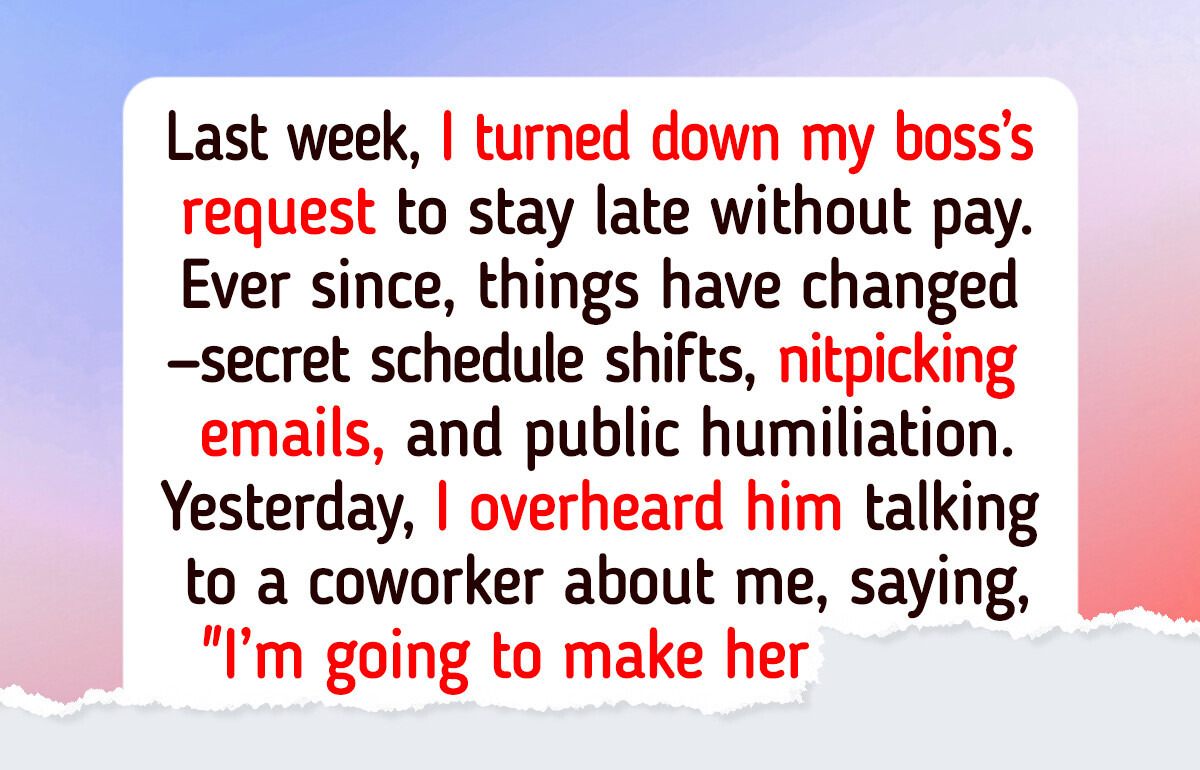I Refused to Work Extra Hours, and Now My Boss Is Making Me Pay

Karlie thought she was simply standing up for herself at work, but what happened next left her questioning everything about her job. Her story shines a light on the hidden struggles many employees face when fairness collides with workplace power.
Hey Bright Side!
So, last week my boss asked me to stay three hours late to finish a project. I told him, as politely as I could, “I can’t stay late without pay.” We’re a small company, and most of us already put in 50+ hours a week, so I didn’t think it would be a big deal.
But apparently, he did. Because ever since that day, things have taken a sharp turn. He started switching my schedule around without saying a word. I’d show up ready to work my normal shift, only to find out he’d marked me as late or absent because he quietly changed my start time. No notice, no email... nothing.
Then the emails started. Little jabs disguised as reminders. Stuff like, “Please remember to use the correct font in reports.” Seriously? In all my years there, nobody has cared about fonts. It felt less like a correction and more like a way to remind me he’s watching.
And it hasn’t stopped at emails. Lately, he’s been questioning my work in front of the team. Flat-out calling me out during meetings, nitpicking things that weren’t even wrong. It’s embarrassing, and you can tell he’s doing it to make me look bad.
The kicker was yesterday. I walked by his office and overheard him talking to one of my coworkers. Clear as day, he said he was going to “make her regret it.” That was about me. Imagine hearing your boss plotting to make your life harder just because you didn’t stay late for free.
I’ve been trying to keep it together and just do my job, but I can’t lie, it’s starting to wear on me. Now I’m stuck wondering what to do. Should I start documenting everything? The schedule changes, the emails, the comments in meetings? Should I take it to HR before this escalates further? Or am I blowing this out of proportion and need to just deal with it like some kind of office politics game?
I don’t have the answers yet, but writing it out like this helps. At least I know I’m not imagining it. Something is seriously off here.
—Karlie
Big thanks to Karlie for sharing her story! It really shows how tricky things can get when you’re just trying to do your job and run into pushback. If you’ve ever been in a similar mess, don’t worry. We’ve got some tips coming up that might help.
When and how to involve HR.

YES, call HR and say to them if this escalated in anyway, you are forced to contact lawyer. Geez, rotten boss need to get whacked on head in anyway possible. Remember to copy and record any communication with your boss
Yes, Karlie, you should start documenting everything. Keep a detailed record of every schedule change, email, meeting comment, or interaction that feels like retaliation. Note dates, times, what was said, and who was present. Even small incidents matter, because a clear record can show a pattern if things escalate.
And yes, it’s a good idea to take it to HR sooner rather than later. Submit a written complaint explaining what’s happening and keep a copy for yourself. This shows you’ve formally reported the issue and creates an official record of your concerns.
What is constructive dismissal?
Karlie, it’s important to recognize when your work situation may be crossing the line into something called constructive dismissal. This happens when an employer creates a hostile or intolerable work environment, and the employee feels forced to resign. Even though you technically leave, the law may view the resignation as being caused by the employer’s actions.
In your case, the constant schedule changes, snide emails, and public criticism could potentially count as intolerable conditions. Look into how constructive dismissal is defined and protected in your country, so you know your rights and options.
Prioritize your wellbeing at work.
If you’re feeling targeted by office politics, it can really help to talk to someone you trust at work. A supportive colleague or supervisor can give you insight, help you sort out what’s really happening, and suggest ways to respond without making things worse.
At the same time, focus on looking after yourself. Take breaks when needed, find ways to manage stress, and make sure work doesn’t take over your life. Keeping your energy and well-being intact will help you handle difficult situations more effectively.
Dealing with a difficult boss can be stressful, especially when retaliation or unfair treatment arises. Stay calm, document incidents, and seek support from HR or trusted colleagues. For perspective, this story about boss retaliation after time off offers practical insights.
Comments
Related Reads
I Refused to Let an AI “Body Scan” Me at a Job Interview—HR’s Reply Shocked Me

My Brother Refuses to Help Our Sick Mom—So I Gave Him a Brutal Wake-Up Call

14 Stories That Prove Living With Kids Is Basically a 24/7 Comedy Show

12 Stories That Prove Real Kindness Is About Actions, Not Words

12 Unexpected Acts of Kindness That Finally Forged Love in These Blended Families

I Refuse to Stop Using My Pool Because Our Neighbor Demands It—My Home, My Rules

12 Moments When Quiet Kindness Became Someone’s Lifeline

I Canceled My Sister’s Free Childcare—Her Cruel Words Cost Her My Support

I Thought My Son’s Wedding Was Perfect, but My DIL Says My Dress Ruined Everything

15+ People Who Went Shopping for Clothes and Ended Up Starring in Their Own Personal Sitcom

My Parents Said I Was Too Irresponsible to Own a Home, Now They’re Begging to Live in It

15+ People Who Just Went for a Walk and Found an Adventure




